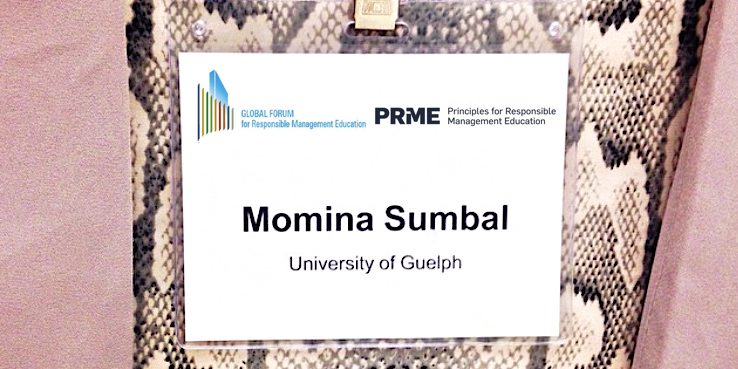Works Five: Momina Sumbal, Sustainability Reporting Analyst

In our ongoing series about The Works’ staff, we chatted with sustainability reporting analyst Momina Sumbal – currently completing her Master of Science in Sustainability Management at the University of Toronto. We talked about where her passion for sustainability comes from, about transparency in reporting, and about why being ethically conscious is good for business. Momina spent her early years in Pakistan prior to moving to Canada, and attended nine different schools before beginning her Bachelor of Commerce in Accounting at the University of Guelph.
WHO first inspired your interest in sustainability?
During my undergrad, I got involved with AIESEC, a student organization that promotes leadership and positive change on a global scale. So it was through them that I was first introduced to how organizations and businesses can make positive contributions to the world, both environmentally and socially. That was when my interest in this field started to develop.

Momina’s involvement with AIESEC as a student exposed her to the different ways institutions and organizations can make positive environmental and social impacts.
I found that my accounting courses didn’t place a heavy focus on CSR, so I enrolled in a course literally titled Corporate Social Responsibility. The professor encouraged us to enter the UN Principles for Responsible Management Education (PRME) competition, where you work in teams to create a video proposal offering a solution for one of the UN’s Sustainable Development Goals. My team chose to tackle SDG #5, Gender Equality, and our proposal won third place internationally. As a prize, we got to go to New York for the PRME Global Forum, and it was super inspiring seeing all of these faculty members, students and business leaders talking about changing the world for the better.
WHAT new opportunities do you see for businesses to manage their impacts?
Because the public is becoming more aware of how much of an environmental and social impact companies have, there’s a bigger call for accountability and transparency in reporting. There’s a huge opportunity for businesses to more openly discuss the challenges attached to their industry. Are there any human rights issues in the company’s history? What is the company going to do to address them? Acknowledging those issues goes a long way. There’s also opportunity to engage stakeholders more. It’s important to find out what your stakeholders’ needs are, figure out how to properly address them, and then incorporate their feedback into your reporting.

After placing third internationally in the Principles for Responsible Management Education competition, Momina got to participate in PRME’s Global Forum in New York City.
WHERE have you observed the most growth and improvement in sustainability reporting?
There’s a trend toward more integrated reporting, and toward providing more comprehensive information on a company’s financial and environmental, social and governance (ESG) data, as well as an increased level of transparency and honesty. Companies are integrating those aspects throughout their reporting and demonstrating how their mission and strategy reflect that. It’s interesting to see the core of business shifting from just making money to making sure that it’s being done sustainably and ethically.
WHEN have you been surprised by what you’ve encountered while analyzing either sustainability reports or the strategies themselves?
Since my background is in accounting, most of my reporting experience in school was strictly financial and all about the numbers. So the first time I encountered CSR reporting, it was interesting to see how companies are able to link their non-financial performance – like environmental and social impact – to the numbers. That concept of doing well by doing good. Due to the numbers-based nature of my first degree, I found it surprising that companies could be profitable not only because their operations were effective, but because they were making a positive impact in some way.
WHY should customers and stakeholders pay attention to the way businesses approach sustainability?
It makes a statement about you as an individual when you care about how the companies you interact with affect the world around you. I genuinely think any systemic change is brought about from businesses, since we interact with businesses more than any other institution. We’re in direct contact with businesses – buying things, comparing prices – all the time. By holding companies and organizations accountable, we as a society can influence the impacts that these companies have on the planet and its communities. Since we engage with businesses so often, this relationship works both ways and influences our sustainability impact as well.




